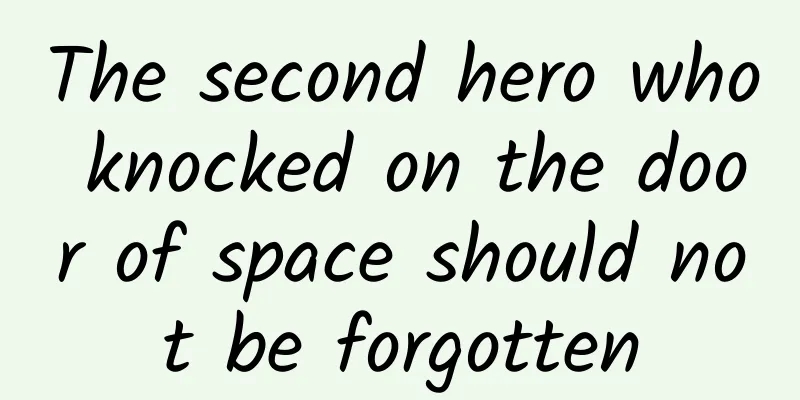The second hero who knocked on the door of space should not be forgotten

|
On August 6, 1961, Yuri Gagarin was awakened from his sleep and told that he was no longer the only astronaut to have been in space. Hearing this news, Gagarin smiled indifferently, then turned over and fell asleep again. At this time, the world's first Soviet astronaut to enter space was visiting Nova Scotia (also known as Novosibirsk Province) in Canada and staying on a farm. Located on the east coast of Canada, it is surrounded by water and has a pleasant climate. It is rated as one of the most suitable places for human habitation in the world by many geographical magazines. For Gagarin, it is an environment for a good sleep. Gagarin later told the Canadian Press that he knew about the space flight in advance, that he and the astronaut had trained together and were close friends, and that he had personally inspected the spacecraft currently in orbit. Gagarin said with confidence that the astronaut was fully capable of controlling his spacecraft and could land it safely on Nova Scotia soil if he wanted to. Before Gagarin's space flight, Titov sat behind him as a backup astronaut From supporting role to leading role The flight Gagarin mentioned was the second space flight of mankind, and the astronaut he mentioned was Soviet Air Force Major German Stepanovich Titov. When Gagarin gave him hope in faraway Canada, as the world's second astronaut, he was maneuvering the Vostok 2 spacecraft to orbit the earth in an orderly manner. German Titov Vostok 2 took off from the Baikonur launch site. The night before takeoff, Chief Designer Korolev took a 15-minute walk with Titov and backup cosmonaut Andrei Nikolayev, gave him final instructions and suggestions, and once again asked him to pay attention to those particularly important links in the flight. That night, Titov and Nikolayev spent a peaceful night before takeoff in the bedroom where Gagarin had slept. On the morning of August 6, 1961, after breakfast, Titov received a comprehensive physical examination by the space doctor, and then put on the orange-yellow sealed space suit, white flight cap and helmet with Nikolayev. The four red letters CCCP (Russian abbreviation of the Union of Soviet Socialist Republics) were prominently written on the helmet. Titov had worn this space suit before Gagarin took off. At that time, he was a backup astronaut and a real supporting role. Now it was his turn to appear as the protagonist. Titov was less than 26 years old at this time. The two astronauts took a large car to the launch pad, and Titov sat alone in the Vostok-2 spacecraft on top of the rocket. Before takeoff, he published an open letter. In the letter, he said that the motherland had opened up a new era of conquering the universe, and he was extremely honored to be able to start his space flight on the Vostok-2 spacecraft. The happiness and pride in his heart could not be expressed in words. He thanked the Central Committee of the Communist Party of the Soviet Union, the Soviet government and Khrushchev for their trust, and thanked the Soviet scientists, engineers, technicians and workers for manufacturing the excellent Vostok-2 spacecraft and completing the preparations for this flight. He was convinced that the flight would be successful, and promised to do his best to complete the glorious and responsible task. Titov on the launch pad With 10 minutes left on the countdown, the Chairman of the State Committee asked Titov how he felt, and he replied that he felt good. At 9:00 Moscow time, the rocket that launched the Vostok 2 spacecraft ignited and took off. During the ascent, Titov felt the separation of each stage of the rocket and withstood the noise, vibration and increasing overweight in the flight without any adverse reactions such as dizziness and nausea. When he found that his feet were flying upwards, Titov realized that weightlessness had occurred and the spacecraft had entered Earth orbit. Rocket ignites and takes off The second "first time" After the spacecraft entered orbit, Titov immediately started working intensively, including routine inspections of the spacecraft equipment and a series of tests. Titov had a good impression of the Vostok 2 spacecraft. He later wrote in an article that the cockpit was as comfortable as a room, and astronauts could sit or lie on the seats to work and rest; the soft light prevented eye fatigue; all parts, including buttons and joysticks, were within reach and within reach. The comfortable spacecraft made Titov feel good about himself, with a pulse of 88 beats per minute and a breathing rate of 15 to 18 times per minute. In fact, the Vostok-2 spacecraft is of the same type as the Vostok-1 spacecraft used by Gagarin for his first space flight, and was designed by Soviet space chief designer Korolev. On top of the spacecraft is a spherical return capsule with a diameter of 2.3 meters and a weight of 2.5 tons. The capsule is equipped with food, drinking water and life support systems for astronauts, as well as ejection seats, observation devices, response devices, optical directional devices and television cameras. Below is an instrument cabin with a diameter of 2.4 meters, a height of 2.3 meters and a weight of 2.3 tons, which is equipped with oxygen cylinders, nitrogen cylinders, whip antennas and reverse thrust engines. The total weight of the spacecraft is 4.7 tons and can carry one astronaut. In order to enable the Vostok-2 to complete a longer flight, scientists have made some technical improvements. At 10:38 Moscow time, when Vostok 2 was flying in Soviet airspace, Titov reported to the Central Committee of the CPSU, the Soviet government and Khrushchev: Vostok 2 was flying smoothly, all systems on the spacecraft were working normally, and he asked them to convey his sincere respects to all the Soviet people. After receiving Titov's report, Khrushchev immediately called him back to express his heartfelt congratulations. When the spacecraft flew over Moscow, Titov replied to Khrushchev's congratulatory message and reported again that the spacecraft was in normal condition. Khrushchev with Titov and Gagarin After the successful launch of Vostok 2, Agence France-Presse commented that Titov's achievement had lost a little of its brilliance due to the repetition (of Gagarin's flight). But it is undeniable that this was an amazing repetition. It is true that Titov's space flight was his second after Gagarin, but he created many "firsts" brilliantly: the first time he started the spacecraft's artificial control system, the first time he took a photo of the earth, the first time he participated in physical exercise, the first time he slept in space, and the first time he ate in a weightless environment: he tasted bread, smoked sausage, liver pie, currant sauce, lemon slices, and vitamin chocolate, etc. Photos taken by Titov in space Another "first" that went down in history was the first time he suffered from space motion sickness. About 7 hours after launch, during the 5th orbital flight, Titov suddenly felt dizzy and nauseous when he turned his head to look at the weightless objects floating in the cabin. This unexpected situation made the astronaut doctor who was monitoring the flight very uneasy, and there was no other way at the time, so he could only suggest that he have a good sleep, hoping that rest would help him recover. This method really worked. During the 7th orbit of the flight, Titov's adverse symptoms were alleviated after sleeping. However, due to this accident, some experiments could not be completed as planned. It was also because of this accident that Titov's name was forever inseparable from space motion sickness. On August 7, Vostok 2 completed its scheduled flight mission and returned home in triumph according to the instructions of the ground command and control center. Titov overcame the overweight during braking, ejected from the spacecraft when approaching the ground, and landed safely in the fields of Saratov Oblast by parachute. However, there is another saying: Titov lost consciousness after returning to Earth. This space flight orbited the earth 17 times, traveled 700,000 kilometers, and took 1,518 minutes, which was 1,410 minutes longer than Gagarin's first flight of 108 minutes. The Vostok 2 return capsule after landing I became an astronaut by chance The launch day of Vostok 2 was a Sunday. At about 11:00, Soviet radio and television stations announced the launch of Vostok 2 as a special program, and the whole of Moscow was once again in an uproar. The jubilant masses gathered in the streets, cheering for another great victory of Soviet science and technology. When the news reached China, party and state leaders Mao Zedong and Liu Shaoqi respectively sent telegrams to Soviet Premier Khrushchev and Chairman of the Presidium of the Supreme Soviet of the Soviet Union Brezhnev, warmly congratulating the Soviet Union on the successful launch of the second manned spacecraft and creating a new miracle. Afterwards, when the news of the astronauts' successful landing was announced through the Central People's Broadcasting Station, many factories, institutions and schools immediately rejoiced. Scholars and experts in the field of science and technology were even more encouraged, believing that the flight time of the Vostok 2 spacecraft was more than a day and night, and that it was much longer than Gagarin's flight time and distance. This was not a simple quantitative increase, but a qualitative leap in the human race's conquest of the universe, indicating that Soviet science and technology had made a great step forward compared to the first launch of the spacecraft. Through the transmission of radio waves, the name of German Titov became known to the whole world. Titov was born in Koshen District, Altai Oblast, Soviet Union in 1935. Influenced by his father since childhood, he gradually grew up to be a clever, excellent student with a strong sense of responsibility and perseverance. After graduating from high school, Titov entered the pilot school and became a pilot of the Soviet Air Force after completing his studies. He flew fighters such as MiG-15 and MiG-17. After the Soviet manned space program began, he actively applied to become an astronaut and successfully passed the strict examination. In March 1960, he joined the astronaut team. In fact, Titov was able to become an astronaut because he concealed an important fact. When he was a child, he accidentally broke his wrist while riding a bicycle, but he did not go to the hospital for treatment, so he never recovered. Later, when he applied for the flight school, he concealed the fact because he was worried that he would not pass the examination. Unexpectedly, he got through. When selecting astronauts, he repeated the same trick and succeeded again. He did not confess this until he returned from space. At this time, the matter was already settled, and people could do nothing about it. Only the doctor insisted that if this matter had been discovered in advance, Titov would not have thought of flying in space. Happy Titov After a period of intense and arduous training, Titov successfully completed all the training subjects. Originally, he had the possibility of becoming the first astronaut to enter space. At that time, Gagarin and he were considered the two most suitable candidates to enter space first. But in the end, another important condition disqualified Titov, that is, the first Soviet astronaut to go to space must be born in a real proletarian family such as a worker or a peasant. In this respect, Gagarin has a clear advantage. He was born in the countryside and was the son of a carpenter. Although Titov was also born in the countryside, he was the son of a rural teacher - an intellectual. As a result, Titov came in second and became Gagarin's backup astronaut. After returning from space, Titov, like Gagarin, was awarded the title of Hero of the Soviet Union and the Order of Lenin, and was invited to visit many countries. However, he was not satisfied with his achievements, but actively prepared to go to space again, and did not give up this idea even after he retired. However, due to various reasons, he has not been able to realize his dream of space travel again. In 1998, when Titov, who was already 63 years old, learned that American astronaut John Glenn had returned to space at the age of 77, he said enviously: "This is the dream of every old astronaut." The retired Air Force general hoped that he could go into space again at the age of 78 and create more glory. Unfortunately, on September 21, 2000, Titov, 65, passed away with this regret, leaving behind his books "700,000 Kilometers of Spaceflight", "17 Cosmic Dawns" and "My Blue Planet" written based on his experience, as well as the eternal record of mankind's second space flight. People should not forget this second hero who knocked on the door of space. |
>>: Headaches come and go! These are the causes of migraines! Here are some tips to relieve them
Recommend
How to improve customer acquisition efficiency and achieve 10 times conversion rate within 150 days?
Many friends who work in P2P would say that there...
User growth has undergone a qualitative change, from AARRR to RARRA!
Today, the topic I want to share with you is the ...
Ling'er Investment Research Diary "Lightning Rod Escape Top Method" is one step ahead, building positions and escaping tops with indicators
Ling'er Investment Research Diary "Lightn...
Shizuishan Mini Program Customization Company, how much does it cost to customize a chemical mini program?
What is the price for customizing Shizuishan Chem...
Guangdiantong Advertising Creative Optimization Operation Guide
This article will bring you the specific steps fo...
Third-party payment, the turning point is coming!
Recently, a number of independent and non-indepen...
In pursuit of the ultimate LeTV super phone, how many "2K" will it have?
As the release date approaches, information about...
60 technical experiences summarized in daily Android development
[[181259]] 1. All Activities can inherit from Bas...
Does nutrition have "density"? The 10 most nutritious fruits and vegetables worth eating in winter
Some foods can provide a lot of nutrition with ju...
E-commerce case: Detailed explanation of data-driven strategies for retaining old customers!
background E-commerce platform A has been establi...
Offline advertising channels and outdoor advertising formats
Outdoor advertising is the earliest advertising m...
Keep operation strategy and gain 170 million users in 4 years!
Recently, keep became popular again with its new ...
Professional Editor - Master Class
Professional Editor-Master Class Xuelang Resource...
"Practical Guidelines for Short-Term Dynamic Psychotherapy" Reading Club
: : : : : : : : : : : : : : :...
APP operation: How to operate the four life cycles of a product
Having been engaged in operations for so long, I ...









